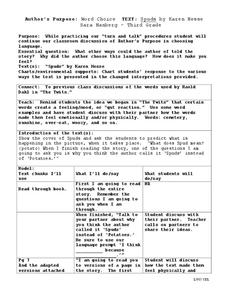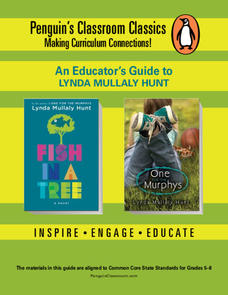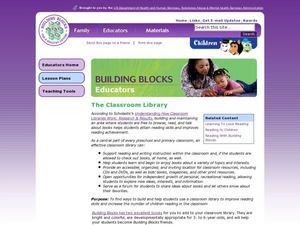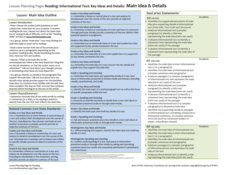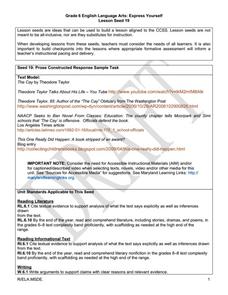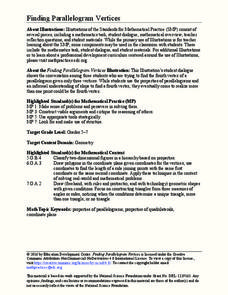Mary Pope Osborne, Classroom Adventures Program
The Backpack Travel Journals
Strap on those backpacks, it's time to travel through history with this literature unit based on the first four books of The Magic Tree House series. While reading through these fun stories, children create story maps, record interesting...
Curated OER
Up Close with Author Allen Say
Students explore the Asian-American culture. They read several books written by Japanese-American author Allen Say and create questions to ask the author. Students write letters to the author.
Curated OER
Word Purpose
Third graders chunk text while reading it. For this language arts lesson, 3rd graders determine the author's purpose for calling certain things the names they are called like spuds for potatoes. Students discuss how words affect the...
Penguin Books
An Educator's Guide to the Works of Lynda Mullaly Hunt
Middle school years can be tough. An educator's guide for the works of Lynda Mullaly Hunt introduces readers to two texts that discuss the struggles pre-teens face during middle school. Chapter-by-chapter questions and activities for two...
Harper Collins
The World of Ramona
Bring the fun and whimsy of Beverly Cleary into your classroom with a teaching guide created to accompany the Ramona series. The guide offers several ideas for classroom use, including independent reading, reading aloud, and literature...
National Endowment for the Humanities
How to Win a World War
High schoolers are have begun to learn the art of diplomacy with each other, but do they understand how diplomacy works at a global level? The second in a series of four lessons, guides scholars in evaluating primary sources. The why...
Curated OER
Surveying Salinger with Dialogue and Disillusionment
Find creative ways to teach Salinger's stories by focusing on dialogue, cultural context, and characterization.
EngageNY
Tracing the Idea of Fish Depletion: Chapter 2
Scholars read chapter two of World without Fish to learn more about the fishing industry. Learners discuss in triads what it means for fishing to become an industry. They then write the gist of pages 28-33 on sticky notes and answer...
Curated OER
Let's Talk Trash
In this solid waste worksheet, students classify the different types of solid wastes found in landfills into given categories. Students predict and tally the total number of each type of item found in the landfill using slips of paper....
Curated OER
The Classroom Library
Youngsters visit the classroom library to complete various reading activities, pushing their motivation to read! They will discuss different library books and read two specific books that use "Building Block" reading skills. They also...
Curated OER
The Strange Case of Dr. Jekyll and Mr. Hyde: Getting Started with Literature Circles
Students complete novel analysis activities for The Strange Case of Dr. Jekyll and Mr. Hyde. In this novel analysis lesson, students work in literature circle groups to complete close reading activities for the novel. Students keep...
Penguin Books
Up Close: Ella Fitzgerald
A reading of Tanya Lee Stones' biography of Ella Fitzgerald lets middle schoolers get up close and personal with the First Lady of Jazz. Stone recounts details of Fitzgerald's life from her early days through her experiences as a teenage...
Curriculum Corner
“I Can” Common Core! 3rd Grade Reading
Third grade readers are given clear learning goals with this Common Core checklist. By turning each reading standard into an I can statement, children can focus on mastering the required grade level skills.
Seussville
Oh! the Places You'll Go!
Honor Dr. Seuss on his birthday with a read aloud of the story Oh! the Places You'll Go! and a variety of activities that inspire scholars to dream of their future endeavors. Readers take part in conversations, research the life of...
Pittford Schools
Literary Devices, Techniques, and Elements
What's the difference between a speaker and an author? What's an example of anthropomorphism? Clarify the meanings of literary devices, elements, and techniques with a comprehensive glossary of terms.
Curated OER
Pourquoi Tales
Lead a web search for information on writers and discuss the craft of purposeful writing as a class. Your students investigate "pourquoi tales" which are "why" stories. and then write their own examples of pourquoi stories to share in a...
For the Teachers
Main Idea Outline
Find the main idea in an informational text with a versatile lesson. Three levels of differentiation help you implement the strategy in any age or class level, based on the ability and objectives of your learners.
Curriculum Corner
Quick Literacy Centers for Back to School
Use a set of quick and easy to use literacy centers at the beginning of the year as you start to assess your students. The 13-page packet provides writing and reading activities with simple directions that allows new class members to...
West Corporation
Making Inferences – Use Your Mind to Read!
How can you tell if someone is happy? The lesson works with elementary and middle school scholars to activate their schema and pay attention to details to make inferences in their daily lives, poetry, and other literature. Cleverly...
Western Illinois University
Activities for Supporting Oral Language Development
Support young scholars' oral language development with the use of four early childhood activities. To reinforce proficiency, pupils read with an adult, play a game of telephone with their peers, put on a play with puppets or stuffed...
Poetry4kids
How to Write an Apology Poem
Put a silly spin on making amends with an apology poem. Budding poets think of a time they were made to apologize although they didn't mean it. They then turn their experience into a poem that offers details and ends with an explanation...
Curated OER
Express Yourself Lesson Seed 19: Synthesis
Wrap up your unit on The Cay with an engaging argumentative writing assignment. Writers must decide if they believe The Cay should be banned. The resource includes links to several articles, which have been addressed and examined in...
Education Development Center
Finding Parallelogram Vertices
Four is the perfect number—if you're talking about parallelograms. Scholars determine a possible fourth vertex of a parallelogram in the coordinate plane given the coordinates of three vertices. They read a conversation...
Curated OER
"Geometry With Quilts"
Fifth graders examine the geometry of quilts. They discuss the history of quilting, design two nine-patch squares, exchange one design on an Internet bulletin board, and construct a hot pad that is quilted.




